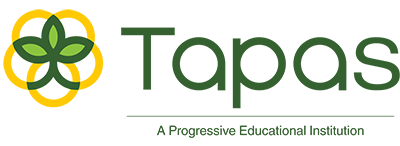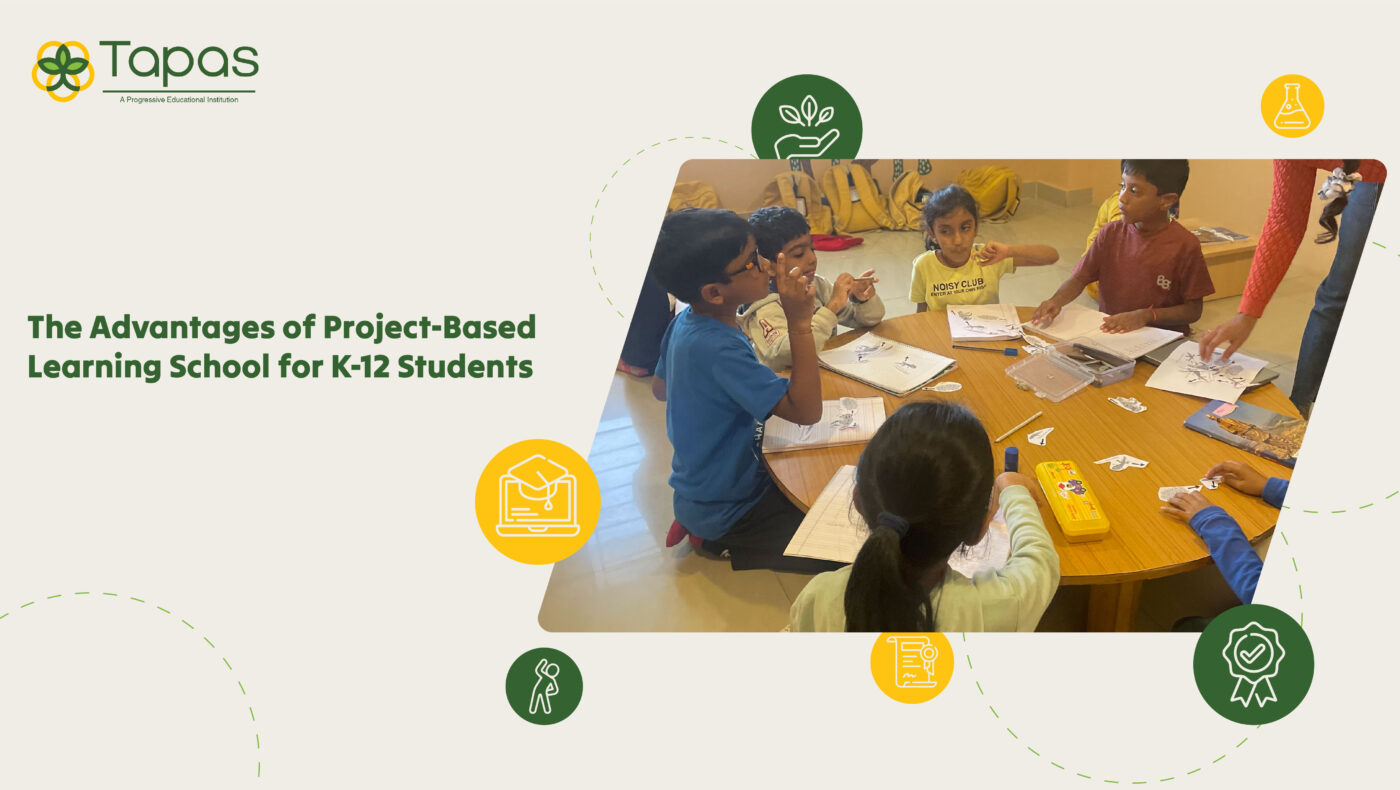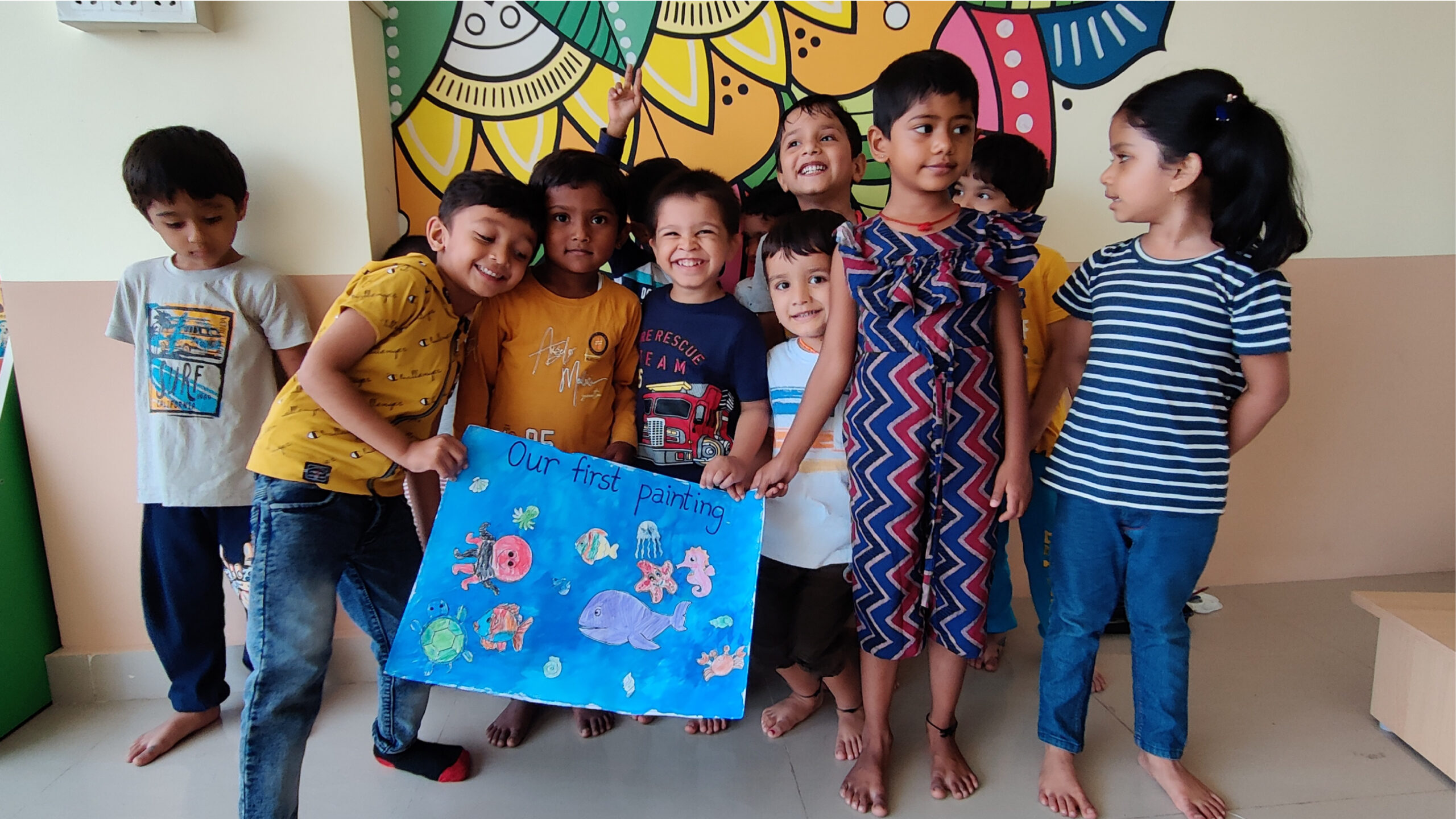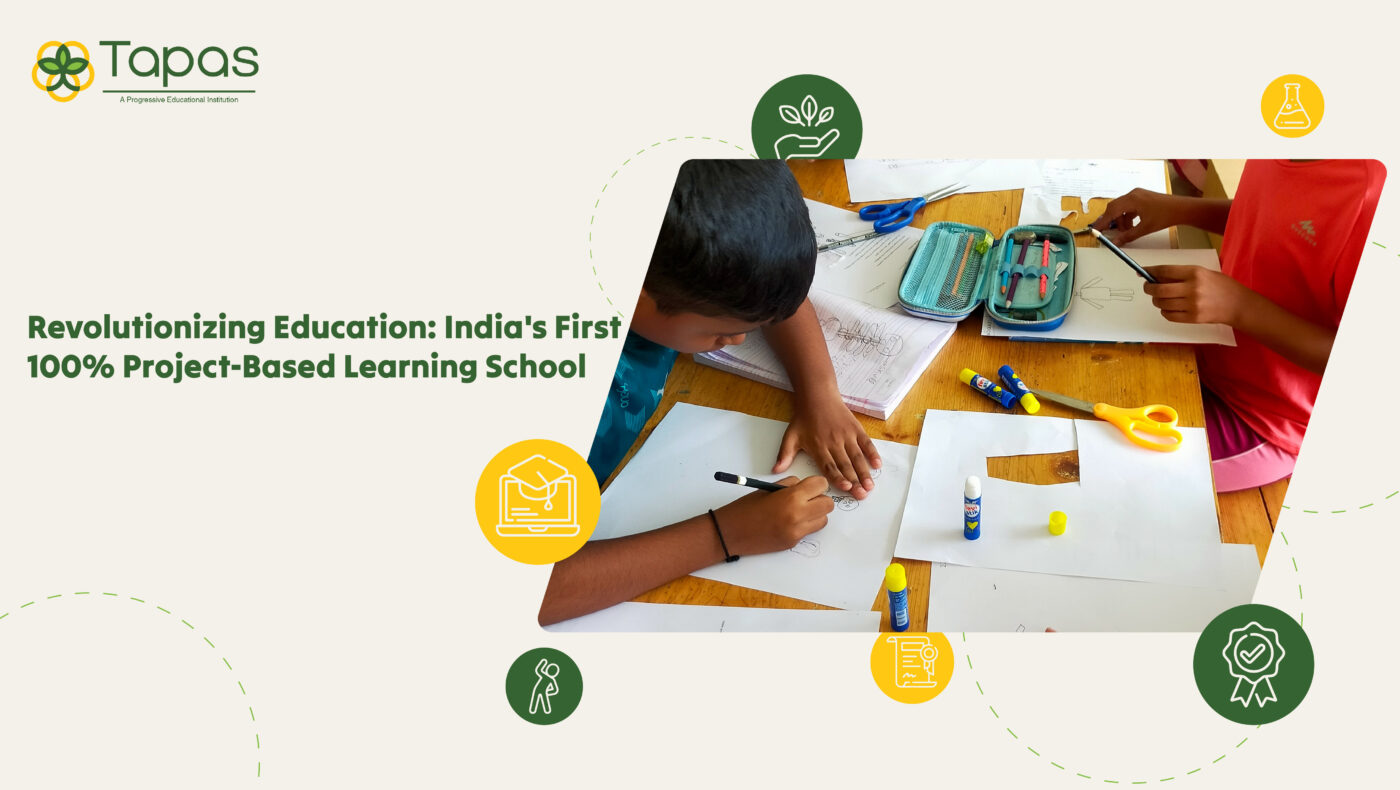Project-Based Learning School in India, TAPAS (The Radical Pedagogy for Revolutionary Schooling), stands as a pioneering institution in the realm of innovative education. Founded on the principles of project-based learning, TAPAS revolutionizes traditional education. It emphasizes immersive, hands-on experiences that encourage critical thinking, creativity, and problem-solving. TAPAS’ holistic approach nurtures well-rounded individuals prepared for the complexities of the real world. With a focus on inquiry-driven learning, the school empowers students to explore their interests and passions while addressing societal challenges. TAPAS demonstrates how project-based learning can redefine education, shaping future leaders and change-makers in India.
Tapas Education stands out for its distinct approach to education, firmly rooted in project-based learning (PBL). Here’s a closer look at its unique educational philosophy:
- Immersive Learning: TAPAS believes in learning by doing. Students engage in hands-on, real-world projects, encouraging active participation and a deeper understanding of concepts.
- Inquiry-Driven: The school places a strong emphasis on inquiry-based learning, allowing students to explore topics that pique their curiosity, and fostering a love for learning.
- Collaborative Environment: TAPAS creates a collaborative learning environment where students work together on projects, promoting teamwork, communication, and social skills.
- Critical Thinking: PBL at TAPAS cultivates critical thinking and problem-solving abilities, preparing students to tackle complex challenges in their academic and future professional lives.
- Creativity and Innovation: The school encourages creativity and innovation through open-ended projects, enabling students to express themselves and develop innovative solutions.
- Real-World Relevance: Every project at TAPAS is designed to have real-world relevance, ensuring that students can apply their learning to practical situations.
- Personalized Learning: TAPAS values individuality, allowing students to pursue their interests and passions, and tailoring their learning experiences to their unique needs and aspirations.
TAPAS’ unique approach to education not only redefines the traditional classroom but also empowers students to become lifelong learners, critical thinkers, and active contributors to society.
The Power of PBL:
Project-Based Learning (PBL) is an educational approach at the heart of schools like TAPAS education that has gained prominence for its transformative impact.
Core Principles of PBL:
- Real-World Relevance: PBL connects learning to real-world issues, making education practical and meaningful.
- Inquiry-Driven: It encourages students to ask questions, investigate, and seek answers independently, promoting curiosity and self-directed learning.
- Collaboration: PBL emphasizes teamwork, fostering interpersonal skills as students work together to solve complex problems.
- Critical Thinking: It nurtures critical thinking by requiring students to analyze information, synthesize knowledge, and make informed decisions.
- Project Ownership: Students take ownership of their projects, promoting responsibility and independence.
Benefits of PBL:
- Critical Thinking: PBL challenges students to think critically, analyze information, and develop innovative solutions to real-world problems.
- Problem-Solving: It hones problem-solving skills by presenting complex, authentic challenges that require creative thinking and resourcefulness.
- Collaboration: PBL fosters collaboration as students work in teams, enhancing communication and interpersonal skills.
- Real-World Application: Students apply knowledge and skills to practical situations, preparing them for life beyond the classroom.
- Intrinsic Motivation: PBL ignites intrinsic motivation as students are engaged in projects that align with their interests, making learning enjoyable and meaningful.
At PBL schools like TAPAS, these principles and benefits form the foundation of an educational approach that nurtures well-rounded, competent, and innovative individuals prepared to excel in the modern world.
Why 100% PBL?
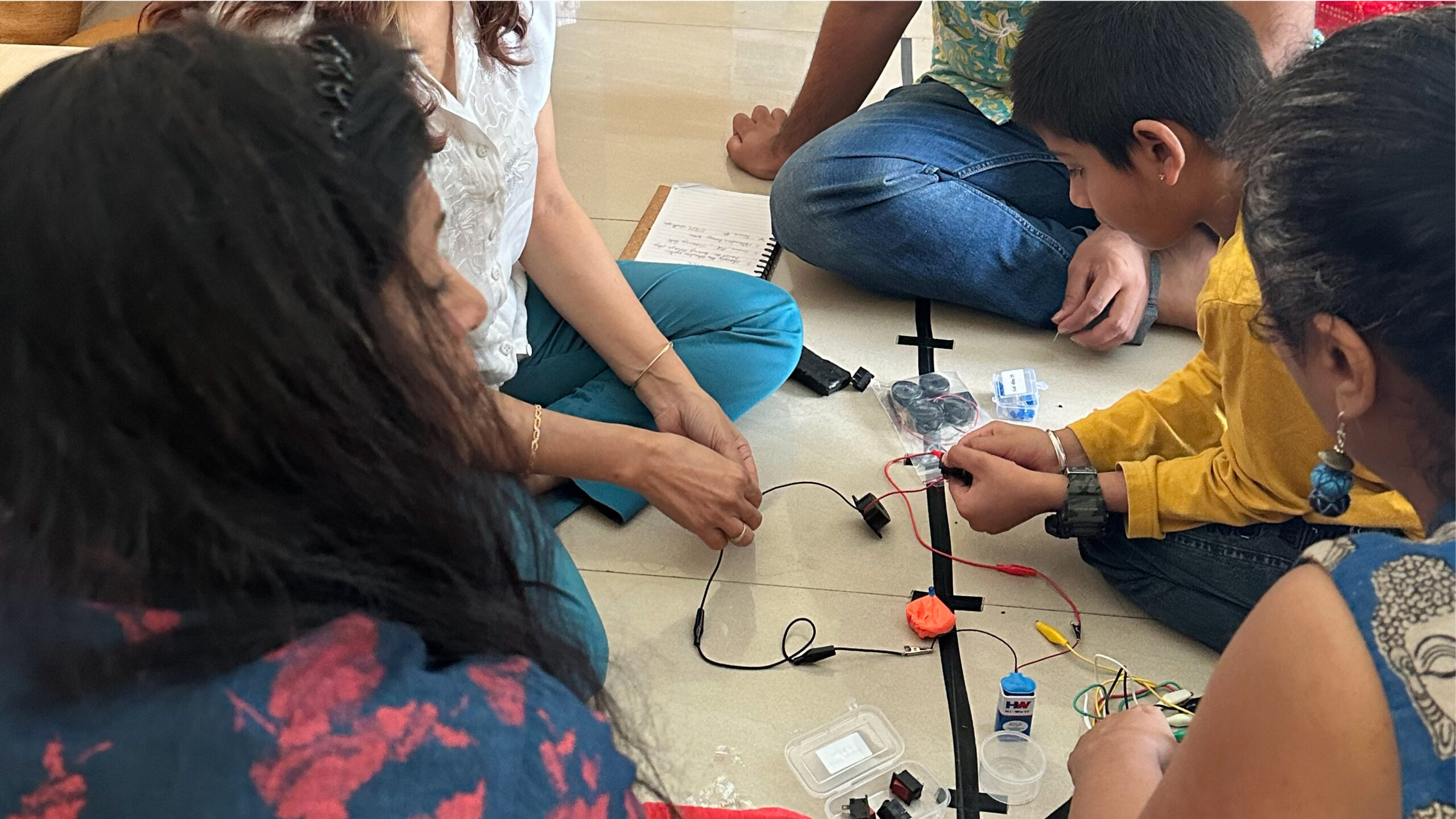
The decision to adopt a fully project-based learning (PBL) model at a school like TAPAS stems from several compelling reasons:
- Holistic Skill Development: PBL fosters a holistic approach to education, emphasizing not only academic knowledge but also critical life skills like problem-solving, teamwork, communication, and creativity. This aligns with the school’s vision to nurture well-rounded individuals ready to excel in the real world.
- Real-World Relevance: PBL connects learning to practical, real-world scenarios. By immersing students in authentic projects, they gain a deep understanding of the relevance and application of their education, preparing them for future challenges and opportunities.
- Fostering Intrinsic Motivation: PBL taps into students’ intrinsic motivation by allowing them to choose projects aligned with their interests and passions. This autonomy and personalization of learning enhances student engagement and enthusiasm for education.
- Preparation for the Future: In a rapidly changing world, PBL equips students with adaptive skills such as critical thinking and problem-solving, which are invaluable for success in an evolving job market.
- Collaboration and Communication: PBL emphasizes collaboration and communication skills, vital in both professional and personal contexts. The school recognizes the importance of nurturing effective teamwork and interpersonal relationships.
- Meeting Diverse Learning Needs: PBL accommodates diverse learning styles and paces, ensuring that each student can thrive in their own way.
- Global Competence: By focusing on real-world issues and collaborative projects, PBL prepares students to be global citizens who can address complex global challenges.
- Innovation and Creativity: PBL encourages innovation and creative thinking, which are crucial for problem-solving and driving progress in various fields.
In essence, the decision to embrace a fully PBL model reflects the school’s commitment to providing an education that not only imparts knowledge but also equips students with the skills, mindset, and motivation to thrive in an ever-evolving world.
Complete immersion in Project-Based Learning (PBL) offers numerous advantages for students, transforming their educational experience in profound ways. In sum, complete immersion in PBL offers a holistic, learner-centric approach that empowers students with the skills, mindset, and motivation to succeed academically and thrive in a rapidly changing world.
Teacher and Student Perspectives:
The adoption of a complete Project-Based Learning (PBL) model brings about a profound transformation in teaching and learning dynamics:
- Shift from Sage on the Stage to Guide on the Side: Teachers evolve from being the primary knowledge deliverers to facilitators and guides. They provide support, resources, and guidance as students take ownership of their learning.
- Student-Centered Learning: The focus shifts from the teacher to the students. Learners actively engage in the learning process, setting their pace and exploring topics of interest.
- Active Participation: Students become active participants in their education. They ask questions, seek solutions, and work collaboratively on projects, fostering a sense of responsibility for their learning journey.
- Application-Oriented Learning: Learning becomes more practical and application-oriented. Students apply knowledge and skills to real-world projects, making education relevant and meaningful.
- Critical Thinking and Problem-Solving: The emphasis on projects nurtures critical thinking and problem-solving skills. Students analyze issues, propose solutions, and evaluate outcomes, becoming proficient in decision-making.
- Creativity and Innovation: PBL encourages creativity and innovation as students tackle complex challenges. They develop the ability to think outside the box and generate inventive solutions.
- Communication and Collaboration: Collaborative skills are honed as students work in teams on projects. Effective communication and teamwork become integral to the learning process.
- Intrinsic Motivation: Students are motivated by their interests and passions, fostering intrinsic motivation. They take ownership of their education, making learning enjoyable and self-driven.
- Lifelong Learning: PBL instills a love for learning that extends beyond the classroom. Students develop the mindset of lifelong learners, equipped to adapt and thrive in an ever-changing world.
- Teacher as Coach: Teachers transition into coaching roles, providing guidance, feedback, and encouragement. They help students navigate challenges and celebrate successes.
This transformation of teaching and learning dynamics underlines the power of PBL in creating a student-centric, interactive, and impactful educational environment that prepares learners for future success.
Challenges and Successes:
Transitioning to a 100% Project-Based Learning (PBL) model is not without its challenges. Initially, teachers may face resistance due to a shift from traditional teaching methods. Ensuring learners adapt to self-directed learning can also be challenging. Overcoming these hurdles requires comprehensive training and professional development for educators to effectively facilitate PBL. Additionally, creating a PBL curriculum that aligns with educational standards while fostering creativity can be complex. Continuous assessment and feedback mechanisms are crucial to address individual student needs. Schools like TAPAS overcome these challenges through ongoing support, a robust training program for facilitators and a commitment to refining the PBL approach over time.
Impact on Students:
At TAPAS Education, a leading Project-Based Learning School, education is molding students to be exceptionally future-ready. By immersing them in hands-on, real-world projects, students acquire essential skills such as critical thinking, problem-solving, and collaboration. This PBL-focused approach nurtures adaptability, creativity, and innovation, preparing students to excel in an ever-evolving job market. Furthermore, it instills a love for learning and the ability to apply knowledge practically. As a result, students from TAPAS are not only academically proficient but also possess the resilience and practical skills needed to thrive in the dynamic and competitive world they will encounter in their future endeavors.
Government and Educational Trends:
TAPAS, with its pioneering 100% Project-Based Learning (PBL) model, has played a notable role in influencing educational policies and trends in India. By showcasing the effectiveness of PBL in nurturing holistic development and future-ready skills, the school has contributed to the shift towards more student-centric and practical learning approaches. This has led to increased recognition of the importance of critical thinking, problem-solving, and creativity in education. TAPAS has also served as a model for incorporating innovative teaching methodologies into mainstream education, inspiring other institutions and policymakers to consider similar progressive approaches to reshape the Indian education landscape.
The 100% Project-Based Learning (PBL) model embraced by schools like TAPAS aligns seamlessly with the global shift toward innovative education. As the world recognizes the limitations of traditional rote learning, PBL stands out for its emphasis on critical thinking, creativity, and real-world application of knowledge. It prepares students to thrive in an increasingly complex and interconnected world, where adaptability and problem-solving skills are paramount. This alignment with global educational trends positions PBL-focused schools like TAPAS as pioneers in preparing students to excel not only in their local context but also on the international stage, fostering global citizenship and competitiveness.
The Future of Education:
The future of education in India is likely to be profoundly impacted by the influence of 100% Project-Based Learning (PBL) schools like TAPAS. This influence will catalyze a shift towards more student-centric, practical, and skills-oriented education, fostering innovation and adaptability among students. PBL-focused approaches will gain wider recognition, contributing to a more dynamic and responsive educational landscape in India.
The potential for scaling up Project-Based Learning (PBL) in the Indian educational landscape is substantial. As schools like TAPAS showcase the effectiveness of PBL in fostering well-rounded, future-ready individuals, other institutions are likely to adopt similar models. PBL can be integrated into various educational systems, from K-12 to higher education, to meet the evolving demands of students and industries. Moreover, government initiatives and policy support can play a pivotal role in encouraging the widespread adoption of PBL, making it a mainstream approach in Indian education.
Conclusion
TAPAS, India’s pioneering 100% Project-Based Learning School, epitomizes a transformative educational paradigm. It empowers students through hands-on, real-world projects, fostering critical thinking, creativity, and adaptability. This innovative approach aligns with global educational shifts, preparing students for a dynamic future. TAPAS serves as a beacon of change, influencing educational policies and trends in India. As it molds students into well-rounded, future-ready leaders, it not only revolutionizes education but also shapes the leaders of tomorrow. TAPAS sets a visionary example, proving that Project-Based Learning, as showcased at https://tapaseducation.com/, is not just a model for education but a catalyst for societal transformation.
